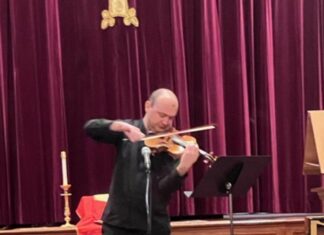NEW YORK — Anahid Ajemian was born in New York, in 1924. She began her music studies early at the Institute of Musical Art, which later merged with the Julliard School. After graduating from the Lincoln School, Ajemian continued her education at Julliard, studying violin with Edouard Dethier, chamber music with Hans Letz and Felix Salmon, and played in and with the Julliard orchestra under Albert Stoessel and Edgar Shenkman.
In 1946, while still a student of Edouard Dethier at the Juilliard Graduate School of Music, she won the Walter W. Naumburg Foundation Award. In the same year, she made her debut at Town Hall and received the Distinguished Achievement Medal from Mademoiselle magazine as the Young Woman of the Year in Music. Among the many honors that have followed, the Order of St. James appointed her a Knight of Malta for her lifelong support of contemporary classical music.
With her pianist sister, Maro, she concertized in Europe, Canada and throughout the United Stares in a wide repertoire including works which for written for them by such distinguished composers as John Cage, Henry Cowell, Lou Harrison, Alan Hovhaness, Ernst Krenek, Wallingford Riegger, Carlos Surinach and Ben Weber, among many others. Together and separately, the Ajemians recorded extensively for Columbia, RCA Victor, MGM and Composers Records Inc. They were the first musicians to receive the Laurel Leaf Award of the Composers Alliance for Distinguished Service to American Music.
Ajemian and her sister were equally known for their interpretations of the standard classical repertoire. A unique feature of the many television programs they taped for NBC’s “Recital Hall” and the National Educational Television Network was their series of programs comprising the complete cycle of all 10 Beethoven Sonatas for Violin and Piano. They appeared as soloists under the batons of Dmitri Mitropoulos, Leopold Stokowski and Izler Solomon, and recorded with the latter two.
Also during the 1940s, Ajemian co-founded the New York City-based organization “Friends of Armenian Music Committee,” which did much to launch the career of fellow Armenian-American composer Alan Hovhaness, via a series of well-received New York concerts of his music. These concerts were repeated in Boston, San Francisco and Los Angeles.
In the mid 1960s, Miss Ajemian and her fellow violinist Matthew Raimondi founded the Composers String Quartet at the suggestion of Gunther Schuller, which quickly earned an international reputation and toured in more that 26 countries, including the Soviet Union, India, the Middle East, Africa, Australia, Japan, Southeast Asia and China. The Composers String Quartet recorded extensively for The Musical Heritage Society, Nonesuch Records, Composers Recordings, Inc. and Columbia Records among many others. The Quartet’s 1970 recording of Elliott Carter’s First and Second Quartets was honored by a “Grammy” nomination, received Stereo Review’s “Best Chamber Music Recording of the Year” Award, and was acclaimed by High Fidelity as “Best Quartet of the Year” and one of the “Fifty Greatest Albums of the Decade.” Time magazine called it “an astonishingly brilliant and unique achievement.”








